Saying Goodbye

Aaron Swartz.
I wasn’t quite awake until the headline announcing the event splashed across my screen in large type, jolted me into full consciousness: Aaron Swartz committed suicide yesterday, January 11th. My first thought: He was so young!

Aaron was a mere 26 years old, and he’d been doing all sorts of things on the Internet for at least a decade already. When most of us were still playing with toys, he was already playing with code and becoming an adept Python programmer, whose code showed an appreciation for clear, reasoned thinking. At the age of 14, he co-authored the specification for RSS 1.0, which specified how posts on blogs and other new sources get syndicated; even today, this blog uses an RSS feed. According to John Gruber, he was the Markdown markup format’s only beta tester. He provided the technical know-how for Creative Commons and helped bring it into being, after which he worked on the Y Combinator-funded project Infogami and ended up at Reddit in its earliest days, helping to build the site that would eventually become one of the most visited on the web. As a reader of this article, chances are that somehow, some way, you’ve benefited from Aaron’s work.
 “The post-Reddit era in Aaron’s life was really his coming of age,” writes Cory Doctorow in his beautiful elegy for Aaron. After Reddit, he directed his considerable energies beyond mere code and data formats to weightier matters. He fought to free information that taxpayers had bought and paid for — public domain case law and publicly-funded academic research — that had been locked away behind paywalls. He founded DemandProgress, whose raison d’etre was to stand up for the general public in public policy fights, such as killing onerous regulations like SOPA and PIPA. As is often the case when one fights the Good Fight, the powerful had a serious bone to grind with him, and he was facing up to 35 years in prison and a million-dollar fine (by comparison, Bernie Madoff’s brother and co-conspirator is facing 10); a disproportionately large punishment for the crime of breaking into a server closet to copy academic journals paid for by — and subsequently locked away from — the public (MIT, where the servers were located, and JSTOR, the publisher, wanted to back down from pressing charges, but there’s strong evidence that the Feds wanted to turn Aaron into an object lesson). I believe, as does Cory, that the fear of imprisonment for a period longer than his lifespan to date, for doing the right thing, helped drive him to despair and to take his own life.
“The post-Reddit era in Aaron’s life was really his coming of age,” writes Cory Doctorow in his beautiful elegy for Aaron. After Reddit, he directed his considerable energies beyond mere code and data formats to weightier matters. He fought to free information that taxpayers had bought and paid for — public domain case law and publicly-funded academic research — that had been locked away behind paywalls. He founded DemandProgress, whose raison d’etre was to stand up for the general public in public policy fights, such as killing onerous regulations like SOPA and PIPA. As is often the case when one fights the Good Fight, the powerful had a serious bone to grind with him, and he was facing up to 35 years in prison and a million-dollar fine (by comparison, Bernie Madoff’s brother and co-conspirator is facing 10); a disproportionately large punishment for the crime of breaking into a server closet to copy academic journals paid for by — and subsequently locked away from — the public (MIT, where the servers were located, and JSTOR, the publisher, wanted to back down from pressing charges, but there’s strong evidence that the Feds wanted to turn Aaron into an object lesson). I believe, as does Cory, that the fear of imprisonment for a period longer than his lifespan to date, for doing the right thing, helped drive him to despair and to take his own life.
The time for anger and resulting constructive action will come, but for me, it’s not that time yet. For now, it’s time for those of us who knew him to remember the young man we knew and admire. This is my tribute to Aaron.
Saying Hello
Back in 2002, Cory Doctorow had managed to snag me a free ticket for O’Reilly’s first “Emerging Technologies” conference, which took place in May 2002 in Santa Clara. Thanks to accidental close match to a 9/11 “watch this person” profile, I was detained and questioned in U.S. Customs and missed my flight, knocking my arrival from the scheduled 4 p.m. Pacific (time enough to meet with friends for drinks and dinner) to 11 p.m.. You must remember that this was pre-Facebook, pre-Twitter, and pre-Foursquare; locating friends and fellow conference-goers required either knowing their phone numbers or popping open your laptop and checking your email — if wifi, then a rare and precious commodity — was available.

Hacking in the hotel lobby, May 2002. That really young kid on the left? That’s Aaron. Wes Felter is the long-haired guy beside him.
I’d resigned myself to the fact that socializing might have to wait until the next day, but as I walked into the conference hotel’s lobby, I saw a familiar face on one of the couches: Wes Felter, developer and author of the blog Hack the Planet. I knew him mostly from IRC conversations on the #infoanarchy channel, where people who worked on peer-to-peer software hung out. After the initial handshakes and quick “great to meet you at last” exchanges, I turned to introduce myself to the person beside him.
“I’m Joey. Joey deVilla,” I said, extending my hand. “Pleased to meet you.”
“I’m Aaron Swartz,” he replied, completing the handshake.
“Wow! AaronSW! RSS Spec!” I exclaimed with nerd-fanboy delight, to which he gave a concerned look. “I love what you’re doing. And hey, you’re in good company with Wes — he’s the most imaginative fetishist I know.”
Again, Aaron hit me with a concerned look, and this time I noticed how impossibly young he looked. Wait, isn’t he still a teenager or something? I thought, reaching back into my mental social files.”I’m just kidding,” I said, and the look of concern turned into an uncertain smile. It was progress.
“Let me tell you about what I had to go through to get here,” I said, and regaled them with the story summarized in my post The Star-Spangled Banner and Anal Sovereignty. Aaron asked questions about my experience with customs: Did they really think I was a terrorist? Was I put in a special holding cell? Why did they check my accordion but not my laptop?
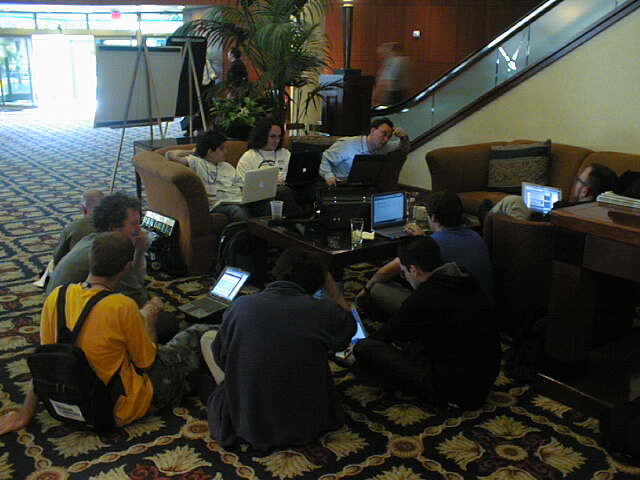
The gang in the lobby. Once again, that’s Aaron on the left side of the couch.
Along with Aaron and Wes, I joined the gang of conference attendees who got more value from hanging in the hallways and in the lobby with drinks in hand, laptops open, sucking in the wifi and the collective brainpower of the people in the room. Yes, we caught some sessions, but there was something special about our pow-wows, where we just hung out, talking not just about tech, but current events, what our plans were, and life in general.
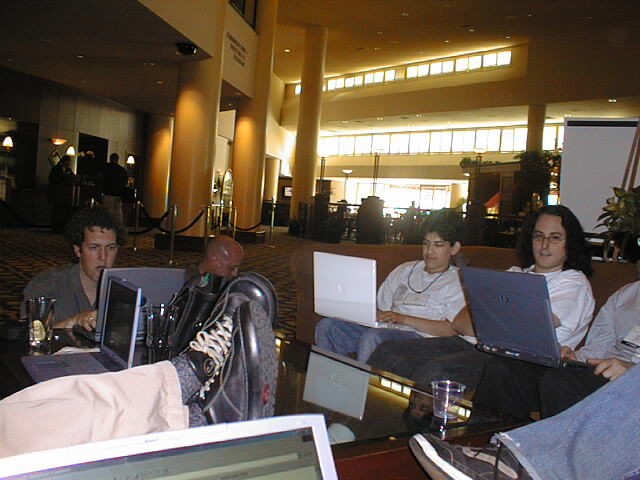
Most of the attendees at the conference were of legal drinking age in the U.S. (twenty-one) or older, and a number of get-togethers were held in places where Aaron, who was barely old enough to drive, wouldn’t be admitted. I’d already done my conference carousing a couple of months earlier at CodeCon (including crashing a bachelorette party) and decided Hey, let’s be a big brother to Aaron. I spent much of the conference with Aaron. We attended pretty much the same sessions, and when we weren’t in a session, we were hanging out in the hotel lobby, where he’d gently tease me about my previous work programming in Visual Basic (one of the least-respected programming languages).
I wasn’t the only big brother: Wes was another constant companion:
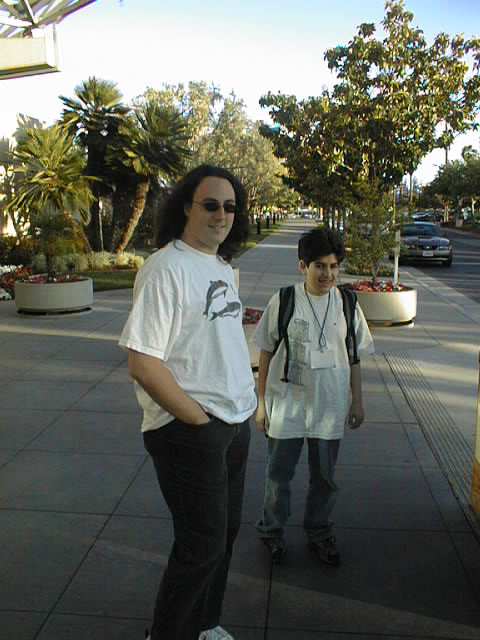
Wes and Aaron, as we wait for our lift to Robert Scoble’s and Dave Winer’s dinner.
…as was Bryce “Zooko O’Whielacronx” Wilcox:
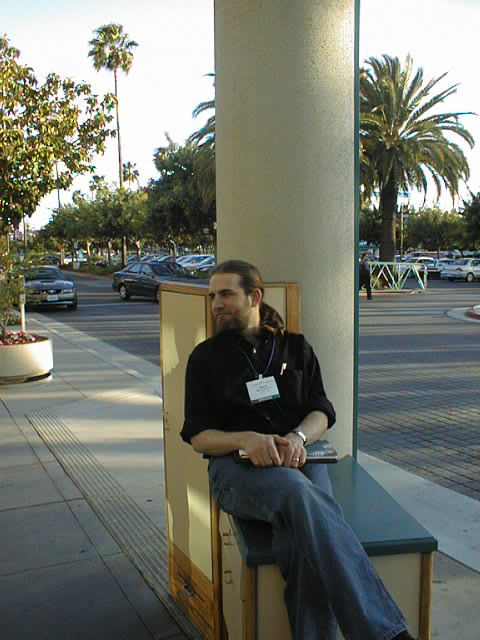
Zooko as we wait for our ride.
…and Lisa Rein played big sister:
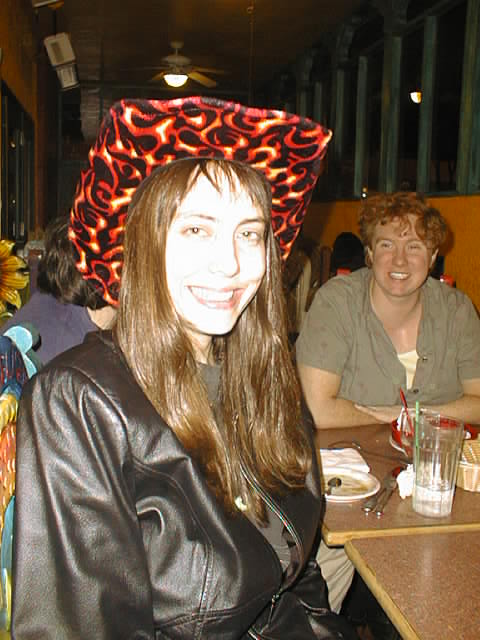
Lisa Rein tries on my cowboy hat as Jillzilla looks on.
One night, we went to a special dinner in Palo Alto put together by two internet personalities who still loom large today: Robert Scoble and Dave Winer. I’d met Dave the year before at a meeting at Microsoft, but this was my first time meeting Scoble.
“Robert Scoble!” I said, shaking his hand. “I’ve been following you since your days at Visual Basic Programmer’s Journal.”
“Visual Basic again?” quipped Aaron, rolling his eyes. “Are you sure you’re a programmer?”
I just shrugged. When a kid’s that much smarter than you, you have to take it.
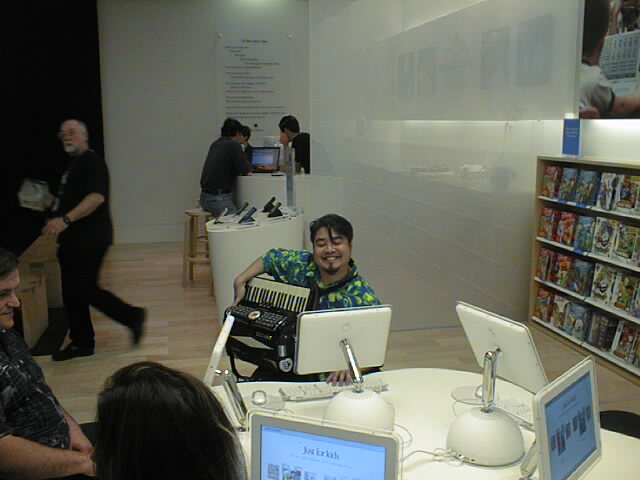
Aaron snapped this photo of me at the Palo Alto Apple Store.
After dinner, Scoble and Winer suggested a trip to the Apple Store to check out the then-new iMac, the one that looked like a tablet attached to a globe. Being a table of nerds, no one objected, and soon we were all gawking at the latest new object of techno-desire from Cupertino.
“Aaron, could you do me a favour and take a picture of me with one of the new Macs?” He obliged, and the resulting photo is the one above.
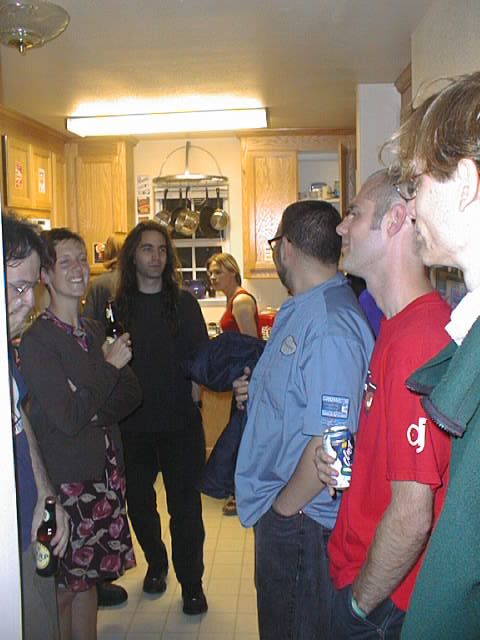
Even at nerd house parties, the kitchen’s the happening place. In the photo: Meg “Megnut” Hourihan, Bram “BitTorrent” Cohen, Quinn Norton, Cory Doctorow and Jason Kottke.
Star Wars: Attack of the Clones had just been released around the time of the conference, and a number of us decided to go catch the movie. This worked well for Aaron, as it wasn’t an age-restricted event at a bar. We started with a little gathering at Quinn Norton’s and Danny O’Brien’s house…
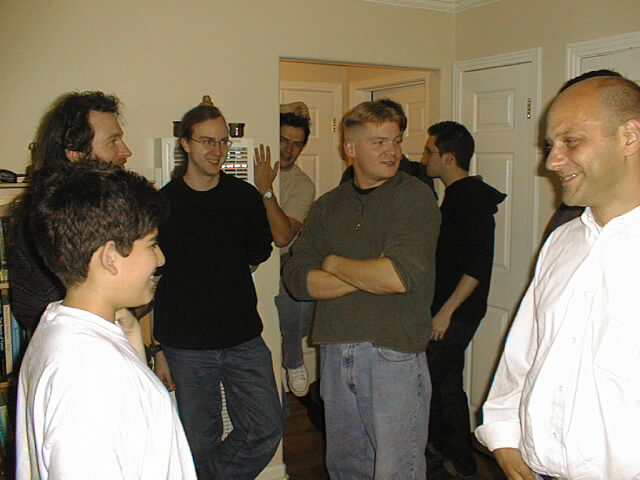
Aaron chats with Lucas Gonze. Kevin Burton looks on and Matt Jones peeks suspiciously through a doorway.
…and much socializing took place. Aaron made quite a splash at the party, not only for being the youngest person there, but also for what he talked about.
I was exposed to Aaron’s impish side that night. While lining up at an outdoor movie ticket kiosk, he saw Quinn sneaking up on me in her Prius, whose engine was in electric mode and silent. He kept mum long enough for her to get right behind me and blast me with the horn, after which he had a great laugh as I spazzed out in surprise.
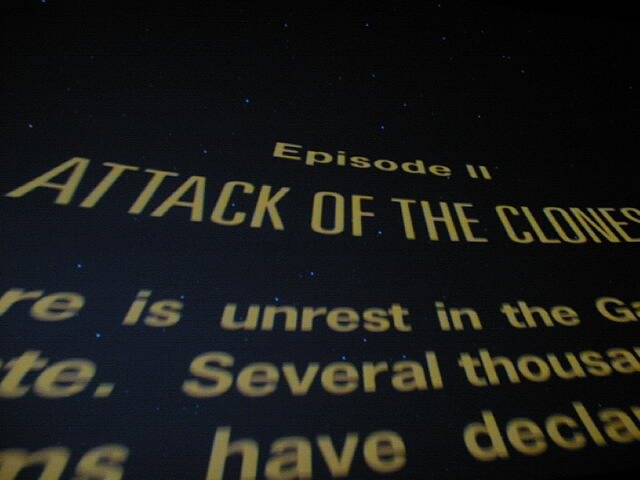
Attack of the Clones opening crawl.
We somehow managed to get tickets despite the crowds and our late arrival. There were very few seats left when we stepped into the theatre, but the front row was still free.
“Front row, then?” I asked Aaron, and he said “Sure.” We took a couple of seats on the left side.
There was still a fair bit of time to kill before the coming attractions came on, never mind the film.
“Dare you to play something,” Aaron said, pointing at my accordion.
“You are so on, young man,” I said. I stood up and played the Star Wars main theme and the Imperial March, getting the audience all riled up.
When the film started, I wanted to get a picture for my blog review. As I pulled out my camera, I said “Keep an eye out for ushers” as I snapped a picture of the opening crawl.
We both got a great laugh out of an all-caps line in the crawl, “CLONE ARMY OF THE REPUBLIC,” and for the next few months, it became a catchphrase for us in IRC chats: “PEER-TO-PEER ARMY OF THE REPUBLIC”, “BOY BAND ARMY OF THE REPUBLIC”, “UNDERPANTS ARMY OF THE REPUBLIC”, and so on.
Goodbye Again
We entered that conference in 2002 as strangers, and left as friends. We ran into each other at other nerd gatherings, and we stayed in touch online, both on IRC, as well as in email and various forums. Over time, distance and Dunbar’s Number got between us, but there was still the occasional communication. I checked his blog every now and again — be sure to read it, it’s full of great, thought-provoking stuff — and the last time I heard personally from him was a comment on my tech blog, Global Nerdy:
Wow, I’ve accused a bunch of people of using Scheme for evil, but I never thought it would have an effect. It’s really good to hear about people taking the moral implications of their work seriously.
That was Aaron: always fighting the good fight, running the good run. Requiescat in pace, young friend. You will be greatly missed.
My Photos from ETCon 2002
In Aaron’s memory, I thought I’d share my photos from ETCon 2002, a number of which feature him. I’ve posted them in the version of the article that appears in my other blog, The Adventures of Accordion Guy in the 21st Century.